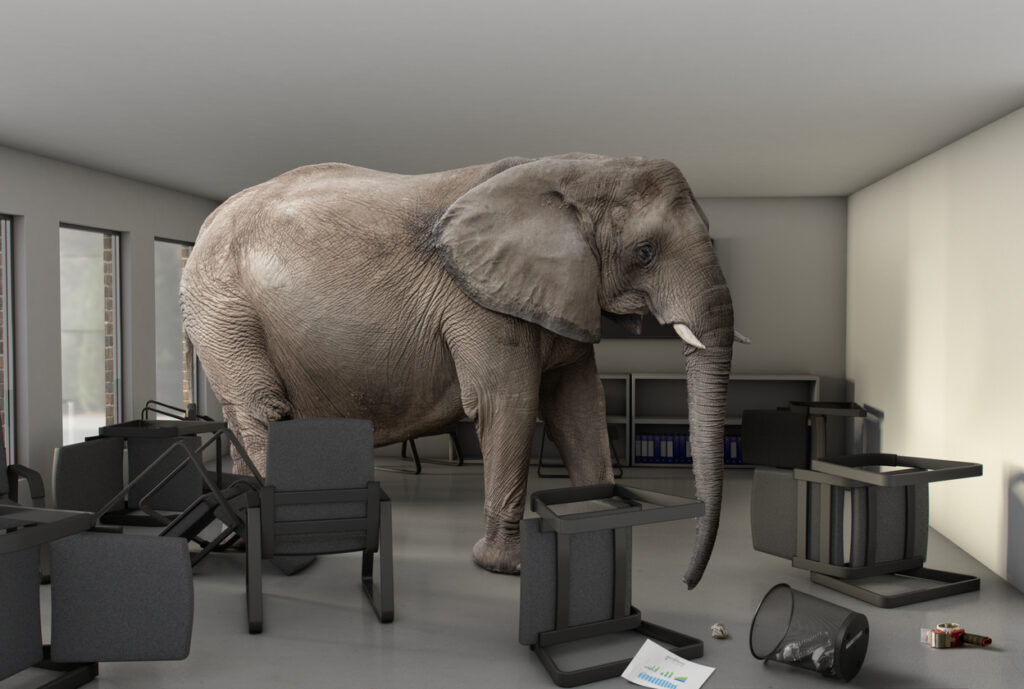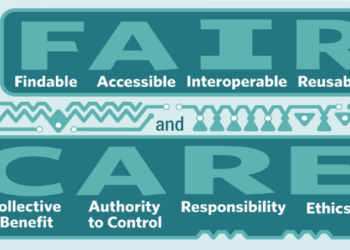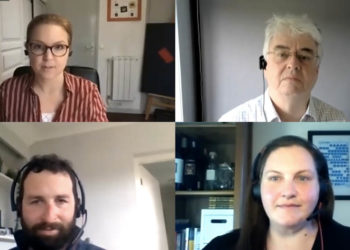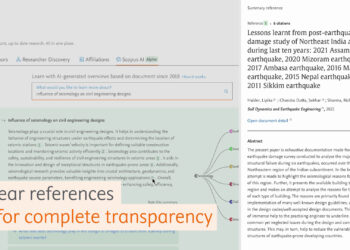The story about blind people describing an elephant is apt right now considering artificial intelligence systems, particularly in scholarly communications. Many people have ideas, but few, if any, can grasp the entirety of the issue. Similarly, it is also an elephant in the room and which, contrary to the saying, we can barely talk about anything else except it being in our room. In some ways, it is overtaking every other conversation.
It seems hardly a conversation takes place in our community lately that doesn’t at least touch on artificial intelligence and its implications on one aspect of our lives or another. In this respect, the NISO Plus Conference, which ended last week, was no different. The AI sessions attracted the largest crowds and drove much of the hallway conversations during the breaks. The conference was kicked off by a provocative talk by Thomas Padilla, Deputy Director, Archiving and Data Services at the Internet Archive, who began the conference with a discussion of ethical open AI. He considered what might make AI systems more trustworthy and reliable. He laid out a set of attributes that open artificial intelligence systems should include: Reusable, Transparent, Accountable, Affirmative, and Sustainable. Building upon this model, Padilla covered the many ways that these attributes challenge the role of AI systems and their present application in the scholarly communications space, noting ways that we could better engage with the systems. The rest of the first day’s conversations relating to AI focused on transparency, trust, consent, and data privacy were packed so full that some people were sitting on the floor. During the second day, the entire track of AI sessions were moved into a larger plenary room. People were keen to discuss whether to build or buy AI systems, copyright issues, provenance, and eventually, disclosure. The final panel envisioned an AI-transformed world ten years from now.
The entire program was not all AI all the time. There were important sessions focused on bibliodiversity and the need for robust worldwide engagement in scholarly communications issues. Another session focused on indigenous knowledge and representations, especially focused on the metadata issues around the same. An entire thread of sessions focused on the open science infrastructure, much of which focused on metadata and interoperability needs for a robust scholarly communications infrastructure.
Another highlight of the NISO Plus conference is always the Miles Conrad Lecture. This year’s award was presented to Ed Pentz of Crossref, whose career has defined many of the contours of identification, interoperability and collaborative work in scholarly communications. Describing how Crossref developed and grew, Pentz focused on the value of connecting research objects and the work of developing and maintaining the nexus (or knowledge graph) of scholarly objects.
One of the core drivers of the NISO Plus event series is a focus on practical outcomes of the conversations. In some respects, there is a workshop aspect to the conference, where ideas are discussed and project ideas are formulated. These ideas were captured in a set of public community notes that the participants created as the conference progressed.
Though too numerous to list in detail, here are some select ideas which could be formulated into projects:
-
AI model guard rails
-
Content attribution in AI models
-
Advance a US National PID strategy
-
Assessment metrics related to societal impacts of research
-
How to engage funders in the research communications ecosystem/Grant IDs
-
Advancing work on addressing author identity and name changes to support equitable representation
-
Exploring metadata repair, equity and incorporating Indigenization to make systems more inclusive
-
Improve standardize and promote metadata and open scholarship practices
The real work of the conference therefore isn’t what happened between the start of the meeting on Monday and its closing on Wednesday. The NISO staff met on Thursday to develop an action plan for collecting, analyzing and vetting those ideas that were captured. The NISO standards leadership committees will meet throughout the spring to consider which ideas are most likely to make impactful change. Volunteer calls will be circulated to engage in launching those projects, with the goal of bringing those solutions to the community as standards, best practices or research initiatives. NISO will also be continuing these threads of conversation in their September NISO Plus Global/Online conference, and further engaging the community in their development.
This model has proved effective in getting new projects off the ground, leading to practical outcomes. Several NISO initiatives have begun in this way, such as the Communications of Retractions and Expressions of Concerns (CREC) project, the NISO Interoperable System for Controlled Digital Lending (IS-CDL), an initiative to identify the problems with software and data citation and improve the workflow to ensure these linkages persist throughout the production process, all developed out of this process. Several more projects are in the formative stages.
A more detailed report of the outcomes and ideas will be circulated later this spring, along with calls for engaging in the development of projects seeking to solve some of the problems identified during the conference. Recordings of the keynotes will also be made available in the coming weeks.
Fellow Scholarly Kitchen Chefs Alice and Tim participated in the meeting and their reflections on the meeting are below:
Alice Meadows
It will come as a surprise to precisely no one that the sessions I attended at NISO Plus were all open research and/or infrastructure-oriented, with a particular emphasis on persistent identifiers (PIDs) and metadata — including the one I organized, on transforming research assessment with PIDs (many thanks to my three excellent speakers: Zen Faulkes of DORA, Sarala Wimaralatne of DataCite, and Richard Wynne of Rescognito). But within that, those sessions covered a broad range of topics, from open scholarship and bibliodiversity to inviting critique and bringing Indigenization to expand metadata systems and practices to open research software. The quality of the speakers and the content was consistently excellent and I learned about a number of (new to me) initiatives, including IDAHO (IDentificAtion of hurdles to open access publishing for researchers with weak institutional ties) and the PCC Task Group for Metadata Related to Indigenous Peoples of the Americas; and heard helpful updates on some more familiar ones, such as NIH’s GREI (Generalist Repository Ecosystem Initiative) and Altum’s ongoing work to implement and encourage the use of PIDs in their grant application system (a whopping 80% of applications now have ORCID IDs!). Having been involved in the NISO Plus scholarship program from the start, I was especially delighted to hear from so many past and present winners, all of whom were both passionate and well-informed about their chosen topics — truly inspiring. I also loved Ed Pentz’s Miles Conrad Lecture; he focused on the importance of collaboration, open communication, teamwork, and equity (all topics close to my heart too), and I very much appreciated his acknowledgement of how his privilege as a Western, university-educated white man has helped his career. If you’re interested, you can read a summary of his lecture on the Crossref blog.
Having been involved in planning and delivering previous NISO Plus events, I know that the emphasis is less on presentations and more on audience engagement — with the goal of identifying concrete suggestions to address the challenges and opportunities the information community is facing. Different sessions took different approaches to achieving this, but in all cases their audiences were definitely keen to engage, which made for some stimulating discussions. Now it’s up to the NISO team and wider community to decide which of the ideas generated to move forward with!
Tim Vines
NISO Plus this year was – to some extent – an intellectually gruelling exercise. I can’t speak for the other attendees, but the explicit focus on AI in many sessions really underlined the deep uncertainty about how (and where) this new technology will impact scholarly publishing. Is ChatGPT “about as reliable as an overconfident private school boy”? Or are there AIs that are close to matching human intelligence and hence revolutionizing the process of scientific discovery?
Since I found myself in the former camp (and having been an overconfident private school pupil myself), I was pushed to sharpen my arguments. Too often we reach for anecdotes (e.g., rat illustrations) to underline the inherent uselessness of AI, but this is the fallacy of hasty generalization. AI will be useful for some part of the peer review and publication process, and for some parts of the community, and it’s our responsibility as stakeholders to bring the right AI tools to those people.
Discussion
4 Thoughts on "What to Do with the AI Elephant in the Room: A NISO Plus Conference Report"
Thanks Chefs, I very much enjoyed the interactiveness of the NISO Plus event, and diverse group of attendees, with that said, I agree with Tim’s thoughts on the amount of AI related sessions, I wonder if this is a signal of what the agendas for future conferences maybe like SSP?
Hello Alice and Todd. Thanks for your roundup of the enriching NISO Conference. If you have a chance will you please correct the session title from the session led by myself and Melissa Stoner — the correct title is “Opening the door: inviting critique and bringing Indigenization to expand metadata systems and practices.” Neither of us have expertise with or experience with the CARE Principles and in our talk, Melissa spoke to issues around the problematic (but popular!) term “decolonization,” presenting Indigenization as a more appropriate mode of operation. Thank you!
Merrilee, thank you for your comment and for the correction. We certainly appreciated your involvement in the conference. I’ve edited the post to address your comment. Also, the CARE principles noted were not discussed during your session but during a different conversation at the conference. I’m sorry for conflating the two in the bullet list, as they’re adjacent, but certainly not the same, issues.
Is there a video available of the final panel’s vision of an AI transformed world ten years from now?




